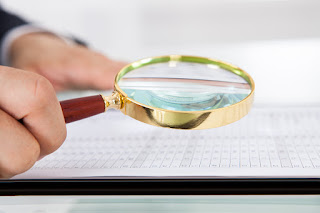When it comes to
specialty practices, one surrounded in mystery is often forensic
accounting. However, we're going to clear up some of the confusion
regarding forensic accounting and explain just how much this practice has
changed over the years. With this being said, here's a look at forensic accounting and how much this occupation has developed as of late.
What Is Forensic Accounting?
 Forensic accounting is
a specialty practice that results whenever litigation or anticipated/actual
disputes are on the horizon for a business. The "forensic" term
translates to "suitable for use in a court of law", meaning that
forensics are the standard (and possible outcome) in which the forensic
accountants have to work with. Forensic accountants are also known as
investigative auditors and forensic auditors. No matter what you call them,
their occupation is to give expert evidence in the event of a trial.
Forensic accounting is
a specialty practice that results whenever litigation or anticipated/actual
disputes are on the horizon for a business. The "forensic" term
translates to "suitable for use in a court of law", meaning that
forensics are the standard (and possible outcome) in which the forensic
accountants have to work with. Forensic accountants are also known as
investigative auditors and forensic auditors. No matter what you call them,
their occupation is to give expert evidence in the event of a trial.
Many police,
government agencies, boutique firms, and large accounting firms have their own
forensic accounting department. However, these groups normally have
sub-divisions that specialize in areas such as royalty audits, construction,
Anti-Money Laundering, fraud, personal injury claims, and insurance claims. It
should also be mentioned that forensic engagements regarding financial matter
can often fall into different categories such as:
- E-Discovery/Computer Forensics
- Business valuation
- Money laundering
- Tax fraud
- Securities fraud
- Reorganization, insolvency, and bankruptcy
- Post-acquisition such as breaches of warranties or earn-outs
- Economic damage calculating, whether they be suffered through breach of contract or tort
What Events Would Constitute Forensic Accounting?
In the event of
professional negligence claims, forensic accountants comment and assess the
work of the professionals in a business. In addition to
this situations, forensic accountants are also utilized for family and
marital law. When forensic accountants are engaged in
such situations, they help determine equitable distribution, income
available for child support, and spousal support. For criminal matters,
forensic accountants are brought typically brought in for situations regarding
fraud. For instances of fraud, forensic accountants are needed to assess the
accounting systems to make sure funds reflect reality.
Some accountants
specialize in the analytics department of forensics, in which they claim, detect, or reconstruct
electronic data to detect fraud. The steps for forensic analytics include:
- Reporting
- Data Analysis
- Data Preparation
- Data Collection
A great example of
forensic analytics would be reviewing the activity of a business
purchasing card to determine whether or not purchases made on the card
were made for personal use.
Differences Between Forensic Accounting & Internal Auditing
The fraud
investigation methodologies of forensic accounting and internal auditing are
fairly different in comparison. In situations of crime scenes, forensic
accounting practices and services must be handled by forensic accounting
experts... meaning that they cannot be done by internal auditing experts
(for obvious reasons). In addition to this, forensic accounting experts can
easily translate numerical data and complicated financial transactions into
terms that the ordinary person can easily understand.
The importance
of forensic accounting translation is based on the fact that
when the fraud case comes to trial, the people in the jury will understand
the layman terms to make a decision regarding the case. In addition to
this, internal auditors go by checklists in which the event of fraud (or
the possibility of covering up the fraudulent case in question) can
easily be ignored when presented to the jury. With this being said,
there's many legal risks that come with internal auditing checklists (as
opposed to information presented by a forensic accountant) which can result
in a very serious malpractice case.
How Forensic Accountants Operate Today
The forensic
accountants of today operate on a simple set of rules and regulations for their occupation. Such rules and
regulations are:
- Litigation procedures and processes
- Evidence gathering
- Investigative techniques
- Data analysis techniques to detect fraud
- Electronic discovery
- Data management
- Auditing and accounting procedures and standards
- Financial reporting systems
- Business information
- Economic theories
Over time, the role of
forensic accounting has evolved and applied more proactive risk
reduction methods to their service. These other roles include assisting with
investment analyst research, fraud deterrence engagements, advising audit
committees, and designing the extended procedures for statutory audits.
No comments:
Post a Comment